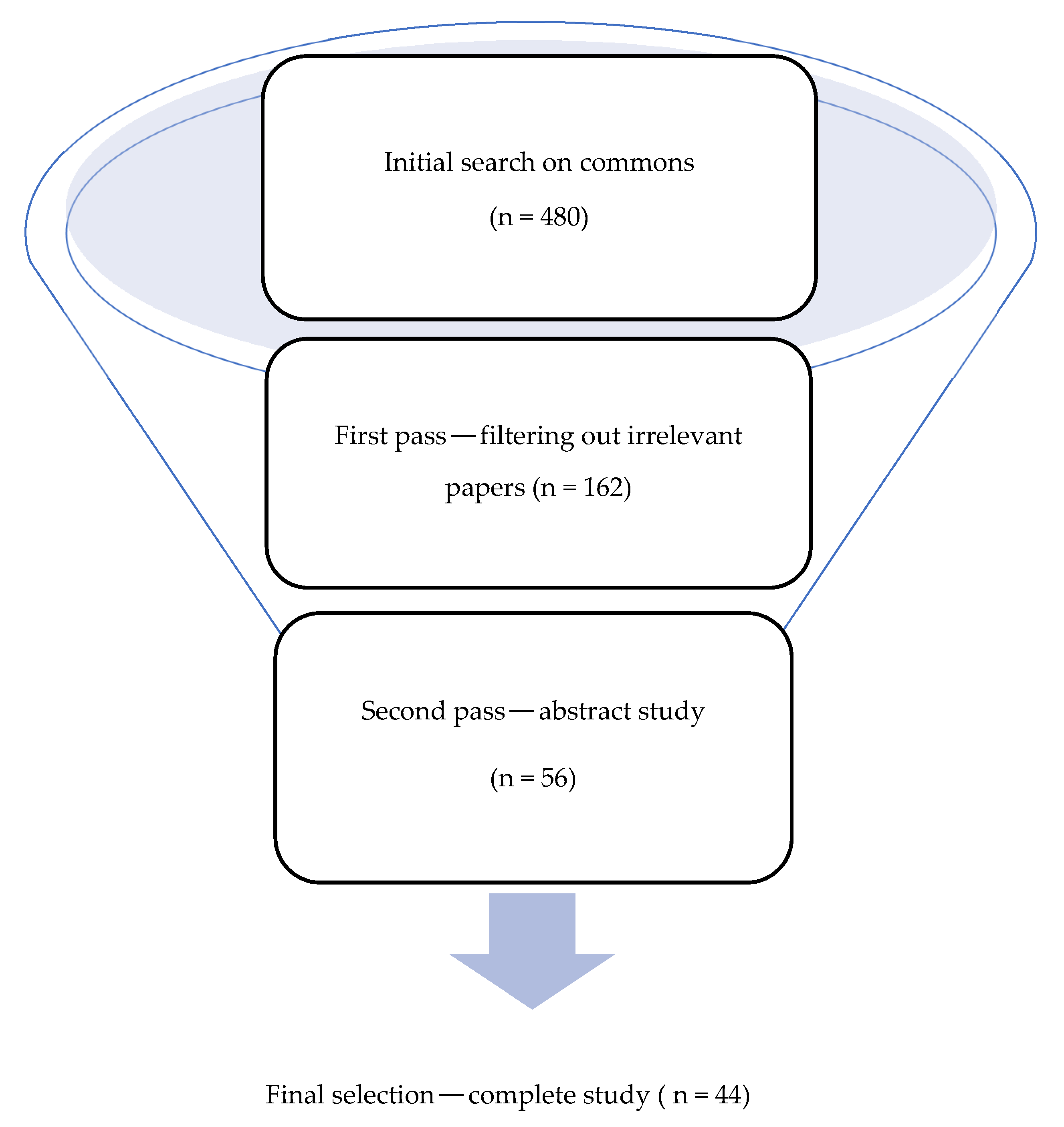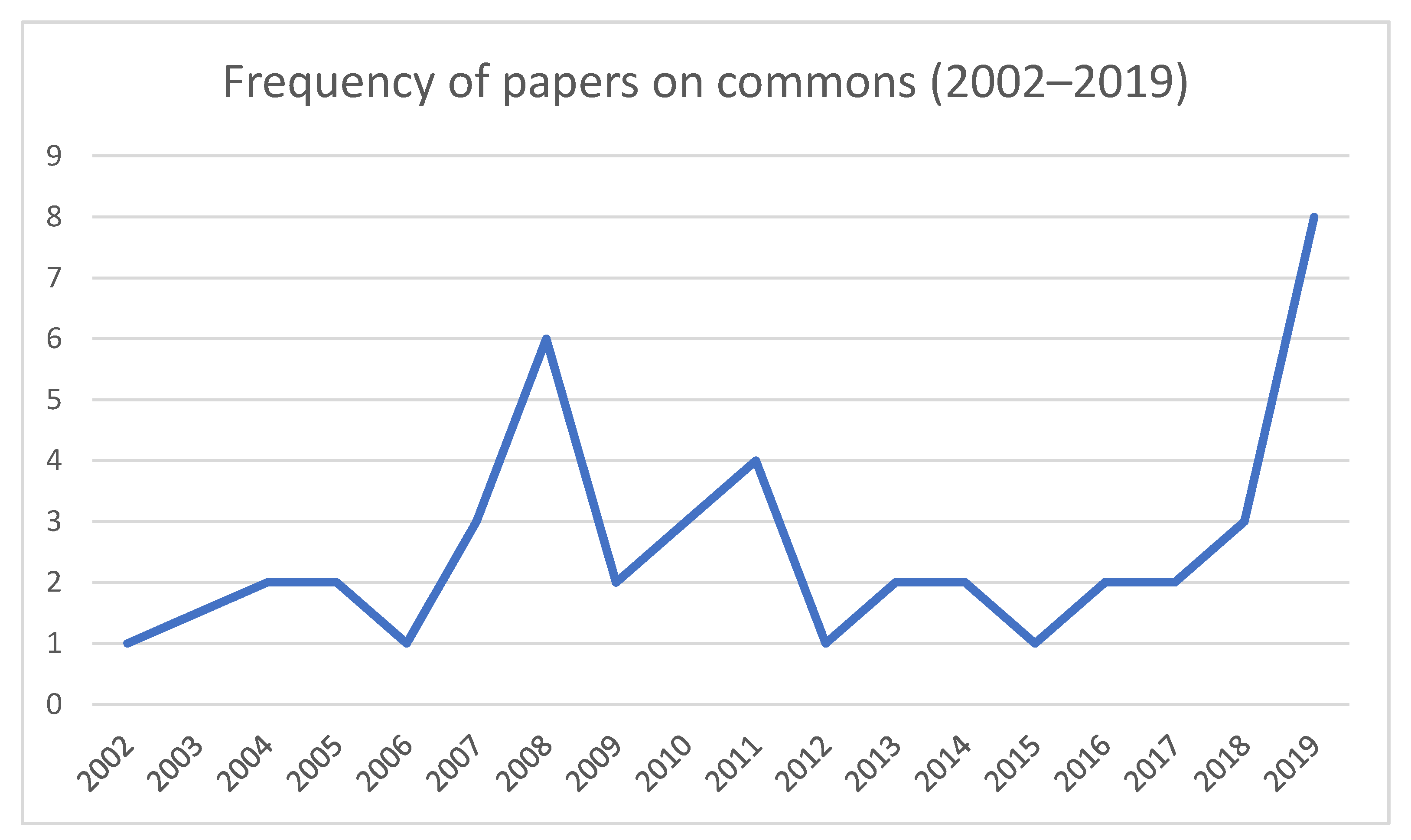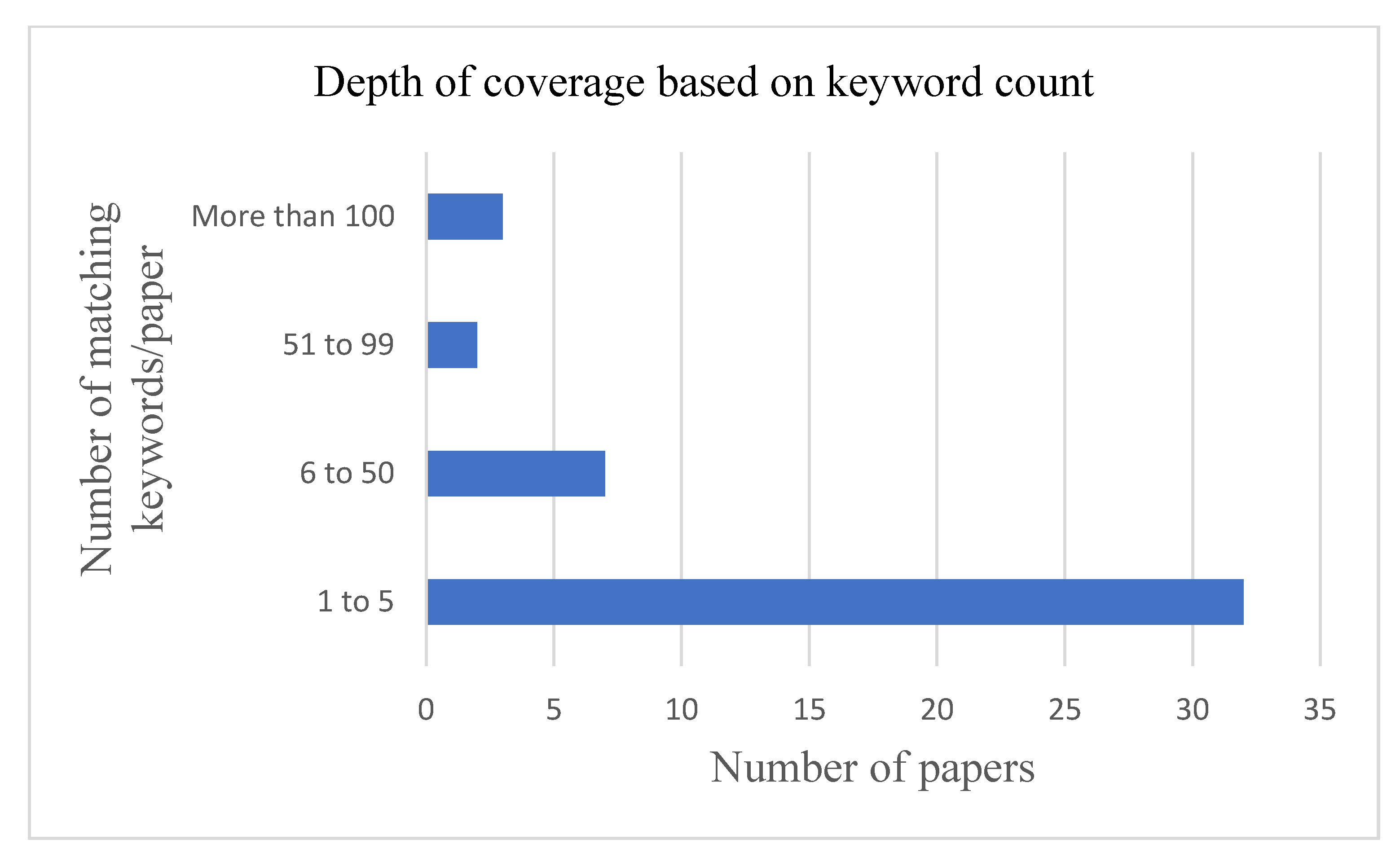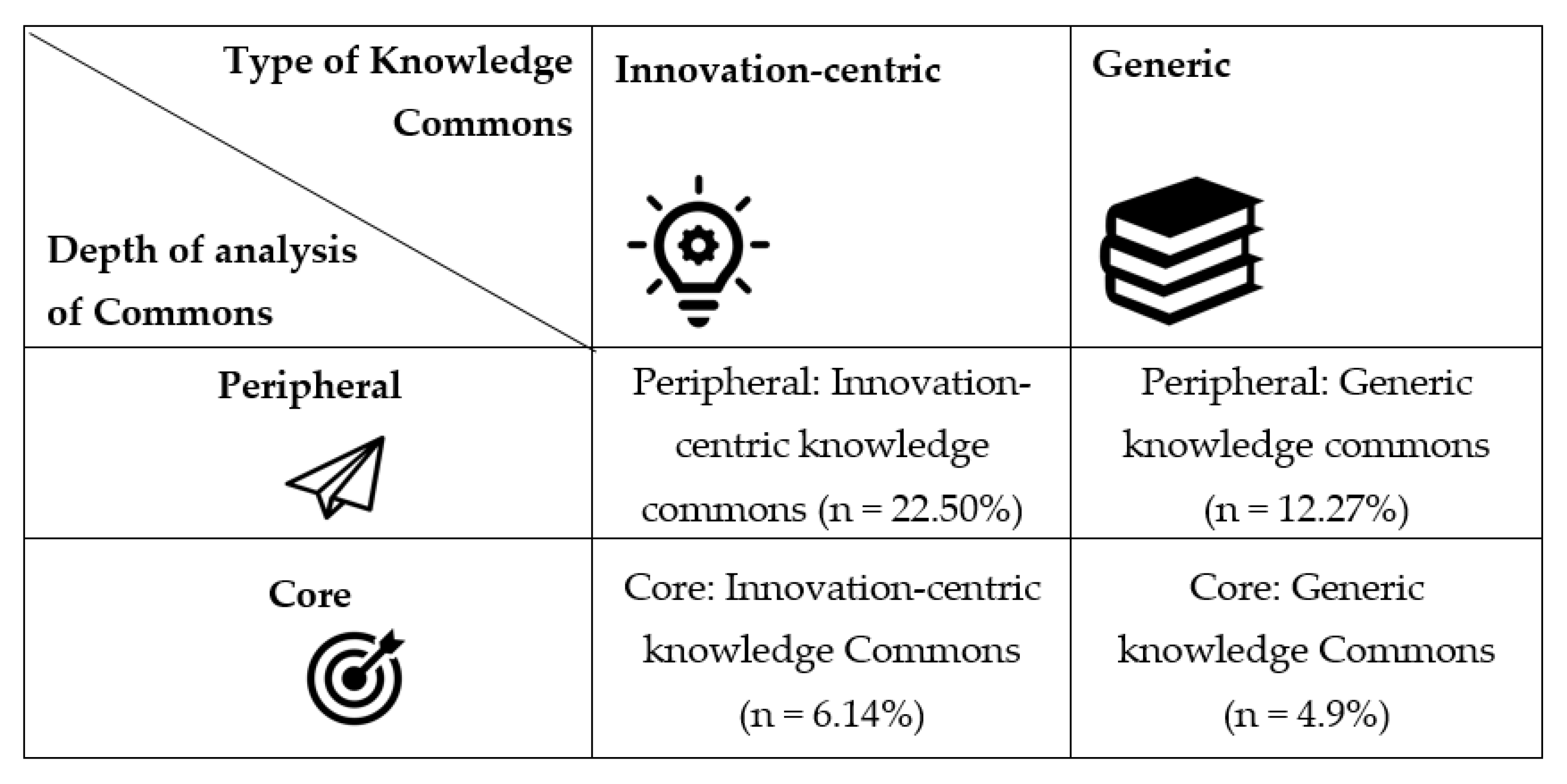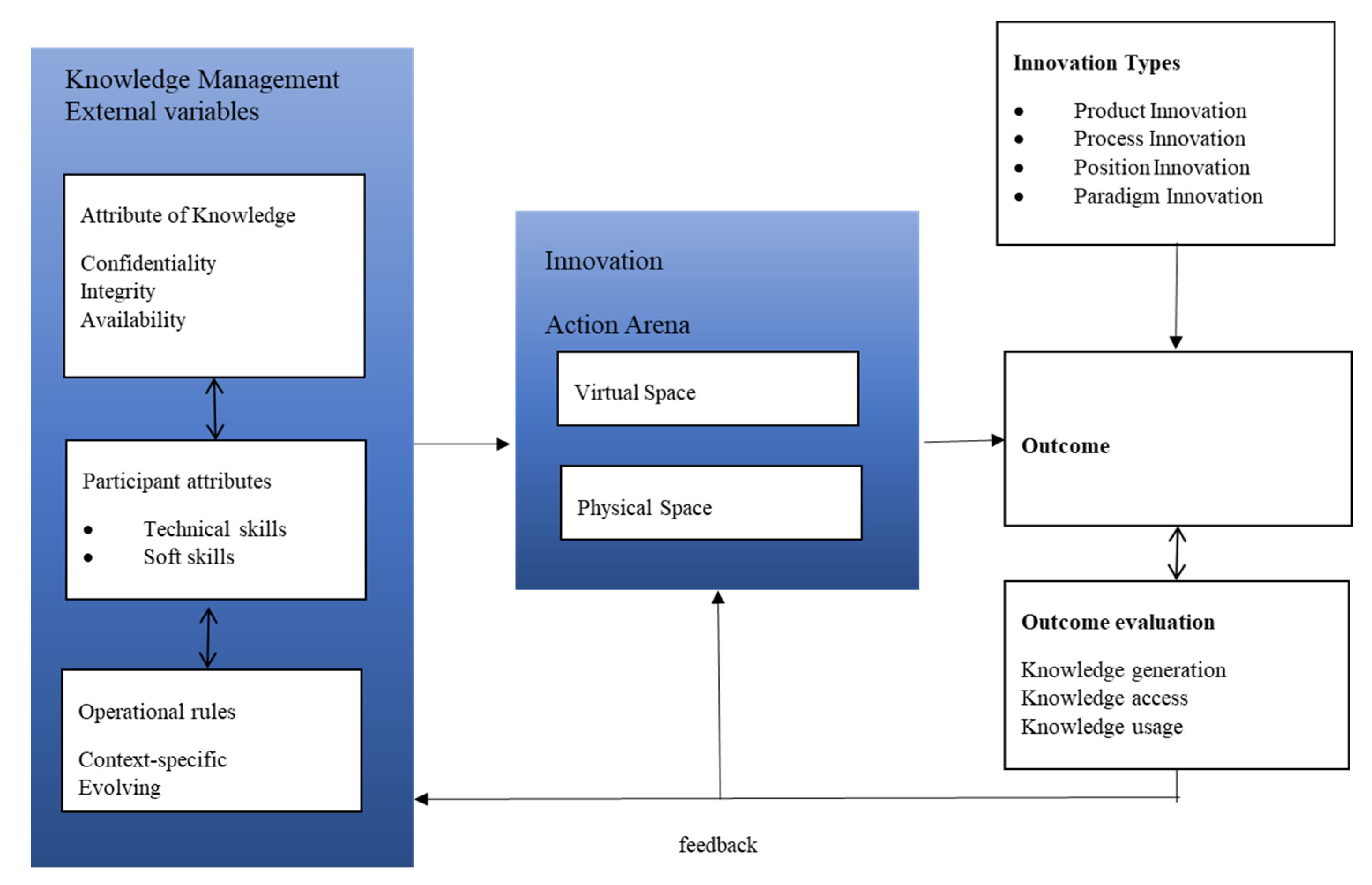Abstract
Commons theory is one of the influential economic theories that study the governance of shared resources, including knowledge. This paper provides a comprehensive view of the application of the concept of the commons towards supporting innovation in the Knowledge Management (KM) literature. A systematic literature review identified forty-four (44) relevant research papers discussed the commons published in twenty-three (23) high-impact KM journals. The research found that the application of commons in KM literature covers diverse areas, including Intellectual Property, Knowledge Cities, and Industrial Commons, that are related to innovation. The study found that extant literature does not adequately address innovation-centric knowledge. To address the gap, a conceptual model is presented to apply the Institutional Analysis and Development (IAD) framework to Open Innovation.
1. Introduction
Knowledge plays a central role in the world economy [1,2,3]. Economies are more strongly dependent on the production, distribution, and use of knowledge than ever before [4]. As the world is facing challenges of a pandemic due to COVID19, opening up the knowledge to promote Open Innovation will further enable us to get practical solutions quicker [5]. Any form of innovation is an entrepreneurial pursuit of creating economic value by combing existing knowledge or creating new knowledge [6,7,8]. Allen and Potts [9] argue that the innovation process does not just commence with the entrepreneur’s new ideas. As a precursor to the innovation process, a common pool of knowledge is desirable for the entrepreneurs to draw information as well as inspiration [10]. One of the applications of Knowledge Commons is the creation of a shared pool of resources. For example, sharing the research on vaccines, ventilator design, and other vital scientific and engineering knowledge is very important to manage the pandemic. In response to the COVID19 pandemic, social scientists working on the Population Council knowledge commons are hosting research on COVID19 and how this virus is presently making an adverse impact on the world’s health and economy [11].
Innovation, irrespective of whether it is open or closed, is dependent on the availability of knowledge. To ensure successful innovation, knowledge has to be identified and managed [12]. A study by Hassan and Al-Hakim [13] explores the relationship between Knowledge Management (KM), innovation, and organizational performance and concludes that performance is directly influenced by KM and indirectly influenced by innovation. A similar study by [14] points out that knowledge from customers has a positive impact on both innovation speed and innovation quality as well as operational and financial performances. While the association of innovation and KM to performance has been established in the extant research, the role of commons that support innovation-centric knowledge is not well researched.
We contribute to the research in two original ways by:
- Exploring the application of commons within KM literature through a Systematic Literature Review (SLR). Based on our review, this is the first time such a study has been reported.
- Focusing on innovation and discussing ways the commons framework can be utilized to support Open Innovation.
The rest of the paper is organized into five sections: We provide the background of Commons, Knowledge Commons and how it is related to Open Innovation in the first section. The method section describes the planning and conducting of the SLR. The results section presents the findings of the SLR and analyzes the review findings. In the discussion section, the gaps identified during the review are highlighted and a conceptual model to address the gaps is presented. The conclusion section acknowledges the limitations of the SLR and articulates the future research directions.
2. Commons, Knowledge Commons, and Open Innovation
Commons theory is one of the influential economic theories that study the governance of shared resources, including knowledge [15,16,17,18,19]. The applications of commons in public policy, natural resources management, intellectual property rights, the open-source movement, and legal studies are ubiquitous [15]. The commons can be any resource shared by a group of people that is subject to social dilemmas [20]. Open pasture lands, forests, and rivers are examples of natural commons. Hardin [16], one of the early proponents of commons, argued that managing a commons resource is a “tragedy”. He rationalized that in an open pasture, each herdsman will try to keep as much cattle as possible for maximizing the economic return which will, in turn, lead to the deterioration of the pasture. According to Hardin [16], a possible solution to the problem of over-utilization of commons is to privatize the commons. Hardin’s view was challenged by Ostrom [18] who argued it is possible to govern the commons successfully through the cooperation of users of the commons property. Ostrom and her team at Indiana University observed many successful commons practices and proposed a governance model. Ostrom’s model is underpinned by the principles of self-governance, collaboration, and collective action. During the latter part of Ostrom’s career, she collaborated with another researcher Charlotte Hess and extended the application of the natural commons model to knowledge [20].
Open Innovation is a paradigm that proposes that the organizations should both leverage external and internal knowledge to expand the market [21]. The Knowledge Commons is applicable to Open Innovation in three levels: 1. Development of a commons artefact, such as a knowledge repository, that is beneficial to the user community [22,23,24] 2. Analyzing and attributing the knowledge artefacts, for example, “Creative Commons” licensing model [15,20] 3. Using the rich conceptual framework, design principles of knowledge commons in designing and analyzing Open Innovation systems. We observe that while the first two categories of applications are reasonably researched, the application of the knowledge commons framework to analyze Open Innovations is still underexplored.
Some studies analyze the relationships between knowledge and Open Innovation [25,26,27]. The relationship between Knowledge Management Systems, Knowledge management capacity, innovation capacity and Open Innovation is explored in a study by Santoro, Vrontis [25]. KMS refers to information systems applied to manage organizational knowledge and to improve the creation, storage, transfer, and application of knowledge. KMC refers to the to retain knowledge over time within the firm. The study concludes that KMS has a direct association with KMC. Moreover, KMS indirectly influences KMC through Open Innovation. Both KMS and KMC are directly associated with the firm’s Innovation Capacity. Knowledge Commons provides another perspective of understanding the governance of KMS. In both Closed Innovation and Open Innovation, there is knowledge sharing between different user communities. The KMS can be considered as one of the action arenas in which social interactions happen. Knowledge Commons provides the tools to design and analyze a knowledge governance framework.
SMEs typically start their journey as closed innovation firms [26]. When the firms grow the path to Open Innovation can be in two independent directions namely knowledge partnership and/or business model. The open knowledge innovation can typically be achieved through partnership with research institutes or Universities. The triple-helix model of innovation is based on the collaboration between universities, government, and the firms [28]. The sustainability of the firm will depend upon the path it takes to grow from the closed innovation model [26].
Yun, Won [29] argue that both closed innovation and Open Innovation will coexist in an organization. The closed innovation effort leads to creating a proprietary knowledge stack (PBS) and the Open Innovation effort leads to a shared knowledge stack (SKS). These knowledge stacks impact the firm’s performance.
Another interesting study [27] analyses the growth of Alibaba, the dominant e-market provider in China. The researchers suggest that a business dynamics feedback loop, combined with an Open Innovation culture are the key reasons behind the growth of Alibaba.
The studies show that Open Innovation is created by collaborating with knowledge communities within the organization or external to the organization. These human collaborations are subjected to social dilemmas, free-riding and benefit-sharing conflicts, self-managing communities, nested enterprise structure [20]. Knowledge Commons provides insights that will complement the current literature on Open Innovation.
3. Methods
3.1. Planning the Literature Review
Evidence-based research and practice were initially developed in medicine as a more reliable alternative to experts’ opinion-based medical advice [30]. In management research, the SLR process is considered evidence-based research. A literature review helps to manage the diversity of knowledge for a specific academic inquiry [31]. The literature review can be broadly organized in three sections, viz., planning the review, conducting the review, and reporting/dissemination [31].
Although the broad intention of the literature review is to systematically collect and present the evidence, there are differences across reviews based on several attributes. Cooper [32] proposes a taxonomy to classify different characteristics for literature review viz., focus, goal, perspective, coverage, organization, and audience. We next present a brief explanation of the taxonomy and an explanation of how we apply this taxonomy in our SLR.
Firstly, the focus deals with the central interest of the researchers. The focus of this research is to understand and analyze the use of commons to support innovation within the KM domain. Second, the goals are concerned with the outcome of the literature review. An obvious goal for a review is to integrate or synthesize the extant literature. The literature review aimed to answer the research question: “How does literature published within the high-quality scholarly KM journals address innovation-centric knowledge commons?” An important goal of this SLR is to identify literature gaps in the extant literature and determine opportunities for future research. Third, the reviewer’s perspective plays an important role in the literature review process and presentation. The reviewer does not always need to play a neutral role. The other position can be “espousal” where the reviewer will advocate an alternative view with supporting evidence. The SLR initially takes a neutral perspective in presenting the results of the selected literature. This research takes the position that the established commons theory needs to be used and adapted for KM to support innovation. However, after the completion of the SLR process, while presenting the results, we take an “espousal” position to probe whether there are opportunities to apply the established commons frameworks within KM that have been successfully applied in other disciplines.
Likewise, the coverage can be exhaustive, exhaustive with selected citations, representative citations, or cite the papers that are pivotal to the research topic. The coverage of this literature review is “exhaustive” within the scope of the review. The scope is limited to quality KM journals. The quality journals are targeted because they “…may dramatically influence the development of entire schools of thought, establish the predominance of inquiry methods, facilitate paradigm shifts and form a discipline’s identity” [33]. Having a clearly defined scope enables the researchers to cite all the relevant literature instances that have applied commons in their papers.
Moreover, the organization of the presentation of the literature review can be chronological, grouped by concepts, or grouped based on methodology. The organization of this SLR is grouped by concepts that are developed based on common themes on KM, Innovation, and Commons. Finally, the SLR should be written in a language suitable for the target audience. This SLR is intended for scholars within the Innovation and Knowledge management practice.
3.2. Conducting the Literature Review
Brocke, Simons [34] argue that describing the process of searching the literature is important for other scholars to be confident about the results. One of the challenges of any literature review is the selection of keywords to search for. There are multiple interpretations of Commons, including but not limited to, Innovation Commons, Information Commons, Digital Commons, Knowledge Commons, and Library Commons. The researchers wanted to understand all the interpretations of Commons and not limit the search to a particular type of commons. Hence, it was decided to just use “commons” as the keyword.
One of the applications of commons is “creative commons”. Since many journal articles are licensed under “creative commons”, it was initially difficult to find the relevant research as most search results were not related to the actual research on “creative commons”. Therefore, we designed the literature search to distinguish between the research topic on creative commons versus the licensing attribution of creative commons. A preliminary search was conducted using the keyword “commons”. We selected the relevant papers that have “creative commons” mentioned in the body (as opposed to license attribution) for subsequent review. Then, the main search was conducted to filter out the term “creative commons” to exclude the papers that were attributed to creative commons licensing.
To identify the quality KM journals, the Scimago journal ranking index [35], and a study by Serenko and Bontis [33] that provided the ranking of KM academic journals were used. Table 1 shows a consolidated list of quality KM journals.

Table 1.
List of Knowledge Management (KM) Journals used in Literature Review.
The next step is to identify the databases that enable the search for “commons” excluding “Creative Commons” within the identified quality KM journals. The researchers considered EBSCOhost and Google Scholar to search within the KM journals and found that the EBSCOhost search was not as effective as Google Scholar. For example, when EBSCOhost was used to search within the journal “The Learning Organization” using the search string “JN:The Learning Organization” AND “commons” NOT “creative commons”, the query returned only one result. A similar search string in Google Scholar commons—“creative commons” source:”learning organization” returned eleven results. Hence it was decided to use Google Scholar as the preferred search engine to query across all databases for the selected journals. Using the Advanced Search feature of Google Scholar enabled the researchers to target their searches to specific journals. The general format is: Commons—“Creative Commons” Source: “Journal Name”
Once all the target journals were searched, a backward and forward search was performed on each article. The process of backward search refers to reviewing the precedent literature cited in the article. For reverse searching, the reference list of the papers was reviewed that specifically discussed commons. One additional paper was included. Likewise, forward search means reviewing subsequent studies that have cited the article [34]. Since Google Scholar provides the “cited by” list, conducting a forward search used this feature. Within the “cited by” list of literature, three additional papers were selected that discussed commons based on forward-searching. However, none of the additional papers were published in the selected list of quality KM journals as presented in Table 1. Hence, they were not shortlisted.
Figure 1 shows the number of articles found according to the filtering criteria. The initial keyword search column shows the number of papers returned from Google Scholar with the keyword search on “commons” on the selected journals. In the first pass, a filter on excluding “creative commons” was applied. It was followed by studying the abstracts of the papers to exclude the papers that did not discuss commons. Based on this criterion, studies that had weak attributions to commons (for example, reference to digital commons web sites) or a different interpretation of the term commons (for example, caves and commons, House of Commons) were excluded. Additionally, it was found that “Commons” can also be a part of the author’s name (for example, John R Commons) cited in KM literature which is not relevant to the topic. After studying the full papers, the second pass removed the duplicate papers as well as studies with very limited and/or irrelevant discussion on commons, resulting in 44 papers that were included for further analysis in this study, as presented in the next section.
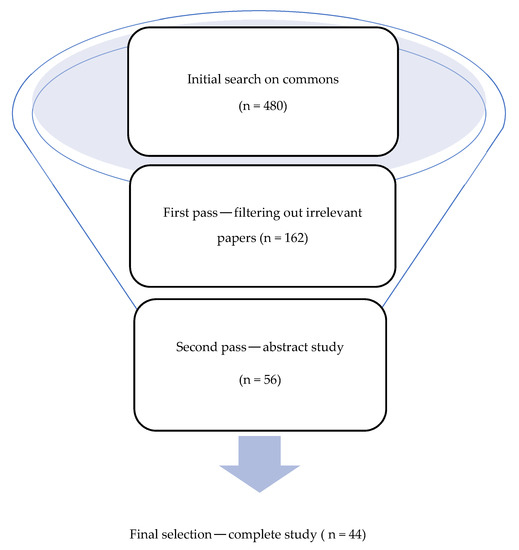
Figure 1.
Literature filtering during the first and second pass of the Systematic Literature Review (SLR).
4. Results
The discussion on commons is cited in the KM journals starting from the year 2002. This suggests that the introduction of the concept of commons in the KM literature has most likely started from the study by Carrillo [36]. This paper explores ways in which KM can enrich and be enriched by practices associated with social-level knowledge-based development. Although the paper used the term “global commons” only once, the principles of commons are argued within the context of global development [36]. Figure 2 presents the frequency count of papers on commons and shows the trend that illustrates two peaks observed in the year 2008 and 2019.
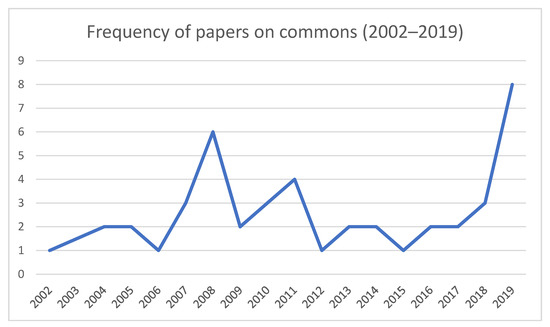
Figure 2.
Frequency of publications (2002–2019).
The trend shows that the interest in the use of commons in KM peaked in 2008 before slowing down but there is growing interest since 2017. The peak in 2019 suggests that there is a growing interest in the commons research among the KM scholars. The next section discusses the keyword analysis and the depth of coverage of commons in the KM literature.
4.1. Depth of Coverage of Commons in the KM Literature
The researchers used the NVivo software [37] for thematic coding and analysis. Using NVivo during the analysis of qualitative data helped the researchers to manage and organize data, manage ideas, query data, visualize, and report from the data [37]. One of the ways to quantify the coverage is to count the number of keyword instances in the paper since keyword density is one of the key parameters of a knowledge resource that may influence positive learning outcomes [38]. Figure 3 highlights that 32 out of 44 (72%) of the papers reviewed include the term commons for less than five times, demonstrating a weak discussion of the commons in the KM literature.
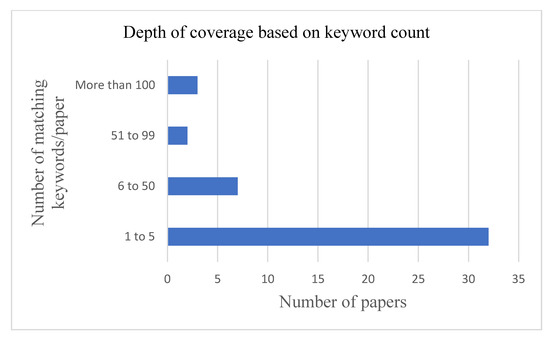
Figure 3.
Depth of coverage based on keyword.
The keyword analysis demonstrates that the depth of research on commons is varied. The in-depth studies complementing the keyword search have confirmed that many papers address commons only superficially. The next section attempts to map the KM literature on the topic of studies associated with Commons that support innovation.
4.2. Literature Mapping
To comprehend the KM literature on commons at a holistic level, a two-dimensional mapping is proposed. In the first dimension (horizontal axis in Figure 4), the papers that have discussed innovation (“innovation-centric knowledge”), are differentiated from the papers that discussed knowledge without an explicit focus on innovation (“generic knowledge”). Typically, the “generic” category had a low number of instances of the keyword “innovation”. This classification is important because not all types of knowledge are relevant to innovation.
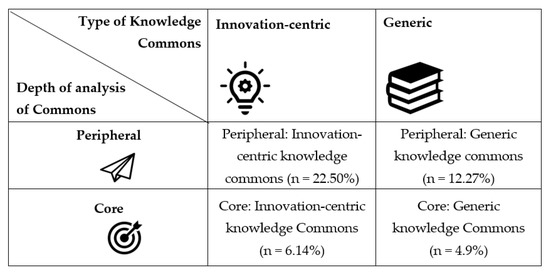
Figure 4.
Literature mapping of commons in KM research.
Similarly, the second dimension (vertical axis in Figure 4) represents the depth of the analysis of commons in the papers. The peripheral category includes papers that do not focus on commons as a major theme of the study. On the other hand, the core category includes papers that discuss commons as one of their major themes of study. In the core category, the selected papers included “commons” or similar terms (common resources, common good) on the title of the paper itself and closely aligned their argument with the commons concept.
4.3. Core: Innovation-Centric Knowledge Commons
The literature mapping in Figure 4 indicates that only 6 papers out of 44 reviewed literature (14%) discussed commons as a primary model to manage knowledge. The study by [39] explores the scholarly commons, also known as academic commons discussing the collaborative approach in publishing scholarly knowledge, and how modern publications are evolving due to the innovation in Information Systems (IS) platforms, open access, and business models.
The study by Ricciardi, Cantino [40] argues that the common good should be the final goal of organizational learning besides improving the performance of the organization. To develop a conceptual model, the study takes inspiration from Commons theory, adaptive management, and organizational theory. Likewise, the conceptual paper by [41] provides a typology of governance structures to manage knowledge as a global resource in the context of multinational corporations (MNCs). The paper argues that MNCs require enforcement mechanisms to exclude external members to ensure that the benefits of knowledge transfer are optimized for the members. The study focuses on the contribution of intangible knowledge that is difficult to transfer as commodities. This intangible knowledge is intrinsic to the MNCs that creates it. For example, if an organization has contributed to industrial innovation, it is important to understand the organization, its social reputation, and other attributes. The tacit knowledge is socially complex and requires a governance structure built based on social interactions.
Similarly, Ferreira [42] addressed the field of the knowledge commons concerning the challenges in international development, while Corazza, Cisi [43] applied the Commons theory to study meta-organizations. Meta-organizations are groups of organizations linked through membership and share common interests, such as belonging to the same business sector or supply chain. The study suggests that social learning plays a mediating role in the effectiveness of governing the commons.
4.4. Core: Generic Knowledge Commons
These studies discuss commons as a core part of their study but they do not relate how knowledge promotes innovation. The importance of nested institutions and a central knowledge sharing system is stressed in the study by Zeng, Costa [44]. Clean air is considered commons in different provinces of China. This study applies spatial econometric modeling to understand the impact of geographically connected social groups. The province management is not organized as nested institutions. As a result, only geographically connected groups cooperate as there are no incentives to cooperate broadly. Zeng, Costa [44] propose to incorporate nested institutional structure and knowledge sharing across China to improve air quality.
The research by Mas-Tur, Roig-Tierno [45] extends the success factor model of Commons proposed by Cantino, Devalle [46]. The research empirically ranks the success factors through an expert group survey [45]. Alternative Food Networks (AFNs) leverage the concepts of self-organization and self-management aiming to shorten the food supply chain and give customers more power. AFNs offer new ways of managing and sharing knowledge across the network and the paper analyses AFNs through the lens of the theory of the commons [47]. Cultural assets can be viewed as commons as the assets belong to communities and are subjected to neglect and misuse. Similarly, a study by Dameri and Moggi [48] proposes a new business model based on cooperative and participative principles, that can be used by cultural firms to manage the cultural commons.
4.5. Peripheral: Innovation-Centric Knowledge Commons
The majority of the papers (n = 22.50%) fall into this category. This category includes papers that marginally consider the commons concept and relate how knowledge contributes to innovation. The anti-commons debate is an argument whether the expansion of Intellectual Property Rights (IPR), in the form of patents and/or copyrights is limiting the benefits of scientific progress [49]. Patenting is viewed as privatizing the property hence it is against the core-philosophy of commons and hence the term “anti-commons” is used to describe patenting. On the other hand, Van Zeebroeck, De La Potterie [50] point out that there has been a sharp increase in academic patenting and argue that the benefits of academic patents on research seem to exceed their potential negative effects.
Studies have raised concerns that a strong IPR regime can impede innovation, particularly in developed countries [51]. The paper by Cummings, Regeer [52] argues that without Knowledge Commons, the knowledge will be manipulated by commercial interests. The concern is regarding over-protecting the Intellectual Property through copyrights and patents thereby restricting the knowledge to developing countries and development organizations. The alternate approach to anti-commons is creative commons protocols and open-source movement that intend to shift the emphasis back onto collective knowledge creation and sharing [53,54,55,56]. Creative Commons redefines IPR by offering copyright that can be shared within a community by acknowledging what aspects of the knowledge can be shared [56].
The terms “intellectual commons” and “learning commons” are used interchangeably while describing the role of modern libraries. In the knowledge economy and digital age, libraries are the main places where people interact to learn and create new intellectual commons [57]. The libraries have diverse learning resources include physical and digital collections, digital repositories, inter-library provision and play a pivotal role in improving the research practices by serving as multipurpose learning commons platform [58,59].
Knowledge commons of cities or “Knowledge cities” imply that the emphasis is placed on the intangible knowledge capital in addition to the traditional focus of physical assets in urban planning [60,61]. Knowledge cities play a fundamental role in knowledge creation and knowledge management [62]. Knowledge cities promote innovation, provide better educational services, contribute to a more sustainable economy, and create a tolerant environment toward minorities and immigrants [61]. Cheng, Choi [62] introduce the concept of subnetworks which takes inspiration from commons theory. The function of subnetworks is to provide benefits to members and exclude non-members from free riding. Youssef and Taibah [61] describe a case study of Jeddah, a Saudi Arabian city being developed as a Knowledge City. The paper discusses an Open Design Studio model that advocates the colocation of three different streams of urban planning and iterative planning.
Similar to the knowledge cities theme, the advantage of territorial colocation is presented in the literature on industrial commons [63,64]. Industrial Commons is derived from natural-resource commons by modifying the attributes to suit the industrial workplace regime. Knowledge societies in developing countries and KM practices applicable to development organizations are an important area in KM literature. KM for development journal (KM4DJ) focuses on this area. Both papers that discussed Knowledge Commons for development [42,52] are published in KM4DJ.
Global Commons are defined as resources that benefit the whole planet, which is managed through the joint effort of international agencies and spawns across multiple governments [36]. The global commons can be natural or man-made. The ozone layer depletion, global warming, financial crisis, and global pandemic are some of the examples where Global Commons can be applied. The World Wide Web can be viewed as a commons that enabled innovation and creativity [65].
Carrillo [36] argues that the concept of KM which is usually applied at the organizational level can also be extended to Knowledge-Based Development (KBD) which is aimed at the societal level. The rationale for KM is to leverage the value-generation capacity of individuals, groups, organizations, societies, and nations. The interpretation of value is broad to include all criteria to determine preferred options. With this broad interpretation, KM can be scaled up to manage global Intellectual Capital.
The paper by White, Cardone [66] proposes a framework for practices in selecting, configuring, and supporting the use of collaboration technologies in international development organizations. The term “commons” is used to note an organizational structure where a pool of resources is allocated. The commons are supported by socio-technical platforms for collaboration and information sharing. The study finds the use of commons is beneficial across different functions of the development organization.
4.6. Core: Generic Knowledge Commons
The term “Information Commons” is used to describe the concept of peer-production of knowledge using the Wiki platforms [67]. The case study by Meloche, Hasan [67] describes the development of a Wiki platform within a large manufacturing organization. The study analyses the factors that positively influence the employees to contribute to the knowledge co-creation and sharing. The conservation of protected areas is a challenging issue as there are conflicting priorities of multiple stakeholders communities. A study by [68] applies Multi-Criteria Decision Making (MCDM) methods in two case studies of Spanish national parks. The study observes that the tragedy of commons is a “myth” and community collaboration is a key component of governance.
The game theory aims to analyze the behavior of interacting participants in strategic situations. A study by [69] addresses the issue of tensions in knowledge flows within organizations through the lens of Game theory. The tragedy of commons is considered as one of the dilemmas. A similar study by [70] proposes a game theory model for Public Goods Game where the participation cooperation is voluntary.
Table 2 summarizes the selected literature categorized on the four quadrants discussed earlier.

Table 2.
Full list of studies across the four quadrants.
It was identified that the KM literature covers a relatively wide range of applications of the commons concept. However, we also confirmed that only limited papers (n = 6) discuss the core commons concepts and expand its discourse within the KM literature and explicitly link these ideas to innovation. In this light, we further discuss the expansion of the role of the identified literature on innovation-centric knowledge commons next.
5. Discussion
The extant literature acknowledges the relationship between Commons and Innovation only at a conceptual level. The themes Intellectual Capital [57], and scientific anti-commons [50] are related to treating knowledge as an intellectual asset and deal with different approaches to manage knowledge to foster innovation. The concept of Industry Commons [51,63,64] has the same underlying principle of collaboration advocate in the Regional Innovation Systems [28].
We observed that KM scholars relate to commons theory primarily through the “tragedy of commons” argument by Hardin [16]. The tragedy of commons is discussed in 24 papers. It is important to explain the theory progression of commons in more detail to point out the limitations in the existing KM papers.
The tragedy of commons is classified as one of the first-generation collective action theories. Collective action theory deals with a group of individuals, a common interest among them, and potential conflict between the common interest and each individual’s interest [84]. The first-generation theories assume that individuals are not capable of achieving joint benefits when left to themselves. First-generation theorists assume the image of atomized, selfish, and fully rational individuals [84].
One of the reasons for the popularity of Hardin is the parables he uses to explain the concepts [85]. The tragedy of commons was explained through a parable of using a common pasture in an English village [16]. While Hardin’s work commenced the debate on commons, the flaw in the initial argument on “tragedy” was pointed out by scholars. Hess and Ostrom [20] highlight four points against the “tragedy of commons”. The limitations in Hardin’s narrative are: (a) the problem of unmanaged open access is different from managed commons; (b) there were no communications assumed between the actors. This assumption is not true in managing the commons; (c) it is assumed that everyone will act only in self-interest. It is overlooked that some participants will try to collaborate; and (d) Hardin offered only two solutions: privatization or government intervention. There are already many alternative successful common models.
On the other hand, the second-generation theorists acknowledge there are multiple types of individuals that exist in an ecosystem, including the ones that are non-selfish and willing to cooperate. Professor Elinor Ostrom is a notable scholar among the second-generation collective action theorists, who was recognized for her work on commons [86]. The body of work she has produced was acknowledged as one that “contributes to some of the most important questions of the twenty-first century….” [86]. Considering the notable work of Ostrom, it is expected that the literature that analyses commons with reasonable rigour would note Ostrom’s contribution and build from there. In the current KM literature according to this review, only 18 papers have cited Ostrom’s work. More importantly, none of the extant literature has applied the second-generation theory to develop or analyze knowledge commons that support innovation. Therefore, in the next section, we apply the Institutional Analysis and Development (IAD) framework which was developed as part of the second-generation commons research [87,88] to the Innovation-centric knowledge commons. In the next section, we extend the IAD framework to conceptualize Open Innovation Knowledge Commons.
Conceptual Model for Open Innovation Commons
Open Innovation has also significant overlapping concepts with Knowledge Commons. Open Innovation is a distributed innovation process that relies on purposively managed knowledge flows across organizational boundaries, in line with the organization’s business model [89]. Both Open Innovation and Knowledge Commons models share the foundations of creating a collaborative knowledge sharing model.
The Institutional Analysis and Development (IAD) framework is a diagnostic tool that can be used to investigate any systems that have human participation [20]. The IAD has been applied to investigate a wide spectrum of systems such as forest governance [90], ecosystem management [91], natural resource governance [92], and nanotechnology development consortia [93]. Thus the model gives a strong foundation to build the conceptual model for Open Innovation.
The IAD has four distinct components—(1) external variable that includes the resource attributes, participant characteristics and rules in use (2) the action arena where the participants collaborate (3) outcomes and (4) outcomes evaluation [88]. To conceptualize Innovation Knowledge Commons, the logical place to commence the analysis is by defining the outcomes. The innovation outcome depends upon the types of innovation. The type of innovation is a logical starting point as there is a link between the innovation type and the knowledge management practices [94]. In IAD, all the remaining components will be influenced by the type of innovation. There are different ways of classifying the innovation types [95,96]. The research by Rowley, Baregheh [95] provides a comprehensive mapping that classifies the innovation into four types viz., (1) product innovation (2) process innovation (3) position innovation (commercial and marketing innovation), and (4) paradigm innovation. Their research points out there is an overlap between the types of innovation. Moreover, one innovation can trigger other forms of innovation. For example, product innovation may lead to many process innovations. A technology firm leading innovation to position its competitive advantage will need a different Innovation-centric Knowledge Commons ecosystem than a small business trying to optimize the internal processes.
The second step in the design of the Innovation-centric knowledge commons is to focus on the external variables including the participant characteristics, knowledge resource attributes, and operational rules. The participant characteristics can consider both technical and non-technical skills. The knowledge resource can be software code, patent application, an experimental setup, or a simple administrative procedure. The knowledge resource attributes such as confidentiality, integrity, and availability will depend upon the type of innovation. The operational rules will influence how the collaboration between the participants is intended. It is important to note that the commons model strongly advocates the participants to develop and evolve local operational rules.
Third, the action arena is the place where the participants actively collaborate to create an innovative outcome. They are the social spaces where participants “interact, exchange goods and services, solve problems, dominate one another, or fight” [88]. The action arena can be an online technology platform, a physical space, or a combination of the virtual and physical environment. It is important to recognize that the attributes of the technology platform need to align with other components of the Innovation-centric knowledge commons.
Finally, the outcome evaluation is required to ensure that the outcome is aligned with the expectations. Allarakhia and Walsh [93] suggest that knowledge generation, knowledge access, and knowledge usage are some of the evaluation options. The analysis should feed the information back to the participants which could influence some changes to the outcome itself. Figure 5 illustrates our attempt to demonstrate the fusion of KM and Innovation from the lens of Commons that can be executed with IAD as a framework. The resultant outcome is coined as the innovation-centric knowledge commons. The innovation-centric knowledge commons conceptual model is shown in Figure 5.
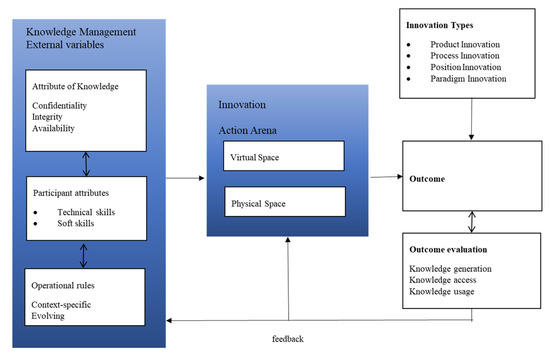
Figure 5.
Application of Institutional Analysis and Development (IAD) framework (Ostrom 1999) to conceptualize Open Innovation.
Although other studies have applied the IAD framework to analyze knowledge commons [15,20,93], they have not specifically extended IAD to innovation-centric knowledge commons. By applying IAD to innovation-centric knowledge commons, the conceptual model provides clarity to conceptualize innovation knowledge. The conceptual model addresses the people, technology, and process aspects of the organizational system design. Figure 5 demonstrates linking the innovation outcomes with the KM external attributes using the innovation action arena gives guidance to researchers and practitioners to execute the IAD framework that promotes innovation-centric knowledge commons.
The application of the IAD framework to innovation knowledge opens new avenues of research. Future research can look more deeply into each of the IAD components, viz, innovation outcomes, KM external attributes, innovation action arena, and outcome evaluation.
The IAD framework is scalable and can be applied at various levels. Typically the IAD is applied to study natural resources and policymaking because of its roots. The model presented in Figure 5 can be applied at an organizational and scalable to regional and national levels.
The complexity of Open Innovation increases from firm-level, regional level, national level and global level [97]. Yun and Liu [97] view this hierarchical Open Innovation System as a Complex Adaptive System (CAS). The IAD can be effectively used to analyze the dynamics of such CAS [19].
In future research, we can explore case studies of applying IAD at various levels. An empirical analysis of existing CAS through the IAD model is also an exciting future research possibility.
6. Conclusions
This study answers the question, “How does literature published within the high-quality scholarly KM journals address innovation-centric knowledge commons?” through a systematic literature review. The review found that KM researchers have leveraged commons theory as one of the broad inputs to support their main themes. There are wide-ranging applications of commons in KM literature including Intellectual Capital, Industrial commons, and scientific anti-commons that are directly related to innovation.
The study suggests there are two gaps in the extant research on commons within the KM domain. The gaps are (1) The lack of research and application of second-generation, collective action knowledge commons, and (2) The lack of research in the area of innovation-centric knowledge commons. This research proposes a conceptual model for Open Innovation that shows the relationship between knowledge, commons, and innovation by extending the IAD framework that is part of the second-generation commons theory. Thus, this research addresses both the gaps by demonstrating the application of a second-generation collective-action framework in building innovation-centric knowledge commons.
One of the limitations of this paper is the consideration of KM papers that are published only in the KM journals that met the quality criteria. This selection implies that other relevant research papers that are published outside the listed KM journals are omitted. The researchers interpreting or applying the results of our SLR needs to consider the limitation. The conceptual model is derived by extending the IAD framework to innovation. The model needs to be validated through empirical evidence, such as case studies.
The researchers believe that this is the first SLR paper conducted in KM literature to understand the application of commons to support innovation. This paper is expected to be a reference for future research on commons within the KM discipline. The IAD model discussed in this paper provides a logical starting point for the researchers and practitioners to understand the institutional arrangements and community dynamics in building or analyzing Open Innovation systems.
Author Contributions
Conceptualization, M.R. and A.S.; methodology, M.R.; investigation, M.R.; writing—original draft preparation, M.R.; writing-review and editing—A.S. and J.S.; supervision—J.S. All authors have read and agreed to the published version of the manuscript.
Funding
This research received no external funding.
Data Availability Statement
Data available in a publicly accessible repository, scholar.google.com.
Conflicts of Interest
The authors declare no conflict of interest
References
- Ferroni, M. World Development Report 1998—Knowledge for Development; The World Bank: Washington, DC, USA, 1998. [Google Scholar]
- Hadad, S. Knowledge economy: Characteristics and dimensions. Manag. Dyn. Knowl. Econ. 2017, 5, 203–225. [Google Scholar] [CrossRef]
- Unger, R.M. The Knowledge Economy; Verso Books: New York, NY, USA, 2019. [Google Scholar]
- Clarke, T. The knowledge economy. Educ. Train. 2001, 43, 189–196. [Google Scholar] [CrossRef]
- Chesbrough, H. To recover faster from Covid-19, open up: Managerial implications from an open innovation perspective. Ind. Mark. Manag. 2020, 88, 410–413. [Google Scholar] [CrossRef]
- Camisón, C.; Monfort-Mir, V.M. Measuring innovation in tourism from the Schumpeterian and the dynamic-capabilities perspectives. Tour. Manag. 2012, 33, 776–789. [Google Scholar] [CrossRef]
- Śledzik, K. Schumpeter’s View on Innovation and Entrepreneurship. In Management Trends in Theory and Practice; Hittmar, S., Ed.; University of Zilina: Zilina, Slovakia, 2013. [Google Scholar]
- Schumpeter, J.A. The Theory of Economic Development, 7th ed.; Harvard University Press: Cambridge, MA, USA, 1934. [Google Scholar]
- Allen, D.; Potts, J. How innovation commons contribute to discovering and developing new technologies. Int. J. Commons 2016, 10, 1035–1054. [Google Scholar] [CrossRef]
- Potts, J. Innovation Commons: The Origin of Economic Growth; Oxford University Press: Oxford, UK, 2019. [Google Scholar]
- Acharya, R.; Gundi, M.; Ngo, T.; Pandey, N.; Patel, S.K.; Pinchoff, J.; Rampal, S.; Saggurti, N.; Santhya, K.; White, C. COVID-19-Related Knowledge, Attitudes, and Practices among Adolescents and Young People in Bihar and Uttar Pradesh, India; The Population Council, Inc.: New York, NY, USA, 2020. [Google Scholar]
- Du Plessis, M. The role of knowledge management in innovation. J. Knowl. Manag. 2007, 11, 20–29. [Google Scholar] [CrossRef]
- Hassan, S.; Al-Hakim, L.A.Y. The relationships among critical success factors of knowledge management, innovation and organizational performance: A conceptual framework. In Proceedings of the 2011 International Conference on Management and Artificial Intelligence, Bali, Indonesia, 1–3 April 2011. [Google Scholar]
- Taherparvar, N.; Esmaeilpour, R.; Dostar, M. Customer knowledge management, innovation capability and business performance: A case study of the banking industry. J. Knowl. Manag. 2014, 18, 591–610. [Google Scholar] [CrossRef]
- Frischmann, B.M.; Madison, M.J.; Strandburg, K.J. Governing Knowledge Commons; Oxford University Press: Oxford, UK, 2014. [Google Scholar]
- Hardin, G. The tragedy of the commons. Science 1968, 162, 1243–1248. [Google Scholar]
- Laerhoven, F.V.; Ostrom, E. Traditions and Trends in the Study of the Commons. Int. J. Commons 2007, 1, 3–28. [Google Scholar] [CrossRef]
- Ostrom, E. Governing the Commons: The Evolution of Institutions for Collective Action; Cambridge University Press: Cambridge, UK, 1990. [Google Scholar]
- Ostrom, E. Coping with tragedies of the commons. Annu. Rev. Political Sci. 1999, 2, 493–535. [Google Scholar] [CrossRef]
- Hess, C.; Ostrom, E. Understanding Knowledge as a Commons; The MIT Press: Cambridge, MA, USA; London, England, 2007. [Google Scholar]
- Chesbrough, H. Open innovation: A new paradigm for understanding industrial innovation. In Proceedings of the 10th Anniversary Summer Conference on Dynamics of Industry and Innovation: Organizations, Networks and Systems, Copenhagen, Denmark, 27–29 June 2005; pp. 1–12. [Google Scholar]
- Forte, A.; Larco, V.; Bruckman, A. Decentralization in Wikipedia Governance. J. Manag. Inf. Syst. 2009, 26, 49–72. [Google Scholar] [CrossRef]
- Safner, R. Institutional entrepreneurship, wikipedia, and the opportunity of the commons. J. Inst. Econ. 2016, 12, 743–771. [Google Scholar] [CrossRef]
- Viégas, F.B.; Wattenberg, M.; McKeon, M.M. The hidden order of Wikipedia. In International Conference on Online Communities and Social Computing; Springer: Berlin/Heidelberg, Germany, 2007; pp. 445–454. [Google Scholar]
- Santoro, G.; Vrontis, D.; Thrassou, A.; Dezi, L.J.T.F.; Change, S. The Internet of Things: Building a knowledge management system for open innovation and knowledge management capacity. Technol. Forecast. Soc. Chang. 2018, 136, 347–354. [Google Scholar] [CrossRef]
- Yun, J.J.; Jung, W.; Yang, J. Knowledge strategy and business model conditions for sustainable growth of SMEs. J. Sci. Technol. Policy Manag. 2015, 6, 246–262. [Google Scholar] [CrossRef]
- Yun, J.J.; Zhao, X.; Park, K.; Shi, L. Sustainability Condition of Open Innovation: Dynamic Growth of Alibaba from SME to Large Enterprise. Sustainability 2020, 12, 4379. [Google Scholar] [CrossRef]
- Cooke, P. Regionally asymmetric knowledge capabilities and open innovation: Exploring ‘Globalisation 2’—A new model of industry organisation. Res. Policy 2005, 34, 1128–1149. [Google Scholar] [CrossRef]
- Yun, J.J.; Won, D.; Jeong, E.; Park, K.; Lee, D.; Yigitcanlar, T. Dismantling of the inverted U-curve of open innovation. Sustainability 2017, 9, 1423. [Google Scholar] [CrossRef]
- Kitchenham, B.; Brereton, O.P.; Budgen, D.; Turner, M.; Bailey, J.; Linkman, S. Systematic literature reviews in software engineering–a systematic literature review. Inf. Softw. Technol. 2009, 51, 7–15. [Google Scholar] [CrossRef]
- Tranfield, D.; Denyer, D.; Smart, P. Towards a Methodology for Developing Evidence-Informed Management Knowledge by Means of Systematic Review. Br. J. Manag. 2003, 14, 207–222. [Google Scholar] [CrossRef]
- Cooper, H.M. Organizing knowledge syntheses: A taxonomy of literature reviews. Knowl. Soc. 1988, 1, 104. [Google Scholar] [CrossRef]
- Serenko, A.; Bontis, N. Global ranking of knowledge management and intellectual capital academic journals: 2017 update. J. Knowl. Manag. 2017, 21, 675–692. [Google Scholar] [CrossRef]
- Brocke, J.v.; Simons, A.; Niehaves, B.; Niehaves, B.; Reimer, K.; Plattfaut, R.; Cleven, A. Reconstructing the Giant: On the Importance of Rigour in Documenting the Literature Search Process. In Proceedings of the 17th European Conference on Information Systems (ECIS), Verona, Italy, 8–10 June 2009. [Google Scholar]
- Walters, W.H. Information sources and indicators for the assessment of journal reputation and impact. Ref. Libr. 2016, 57, 13–22. [Google Scholar] [CrossRef]
- Carrillo, F.J. Capital systems: Implications for a global knowledge agenda. J. Knowl. Manag. 2002, 6, 379–399. [Google Scholar] [CrossRef]
- Bazeley, P.; Jackson, K. Qualitative Data Analysis with NVivo; Sage Publications Limited: New York, NY, USA, 2013. [Google Scholar]
- Syed, R.; Collins-Thompson, K. Optimizing Search Results for Educational Goals: Incorporating Keyword Density as a Retrieval Objective. In Proceedings of the SIGIR 2016, Pisa, Italy, 17–21 July 2016; Available online: http://ceur-ws.org/Vol-1647/SAL2016_paper_21.pdf (accessed on 4 June 2020).
- Orlandi, L.B.; Ricciardi, F.; Rossignoli, C.; De Marco, M. Scholarly work in the Internet age: Co-evolving technologies, institutions and workflows. J. Innov. Knowl. 2019, 4, 55–61. [Google Scholar] [CrossRef]
- Ricciardi, F.; Cantino, V.; Rossignoli, C. Organisational learning for the common good: An emerging model. Knowl. Manag. Res. Pract. 2019, 1–14. [Google Scholar] [CrossRef]
- Millar, C.C.; Choi, C.J. Development and knowledge resources: A conceptual analysis. J. Knowl. Manag. 2010, 14, 759–776. [Google Scholar] [CrossRef]
- Ferreira, S. Evolution and future of the knowledge commons: Emerging opportunities and challenges for less developed societies. Knowl. Manag. Dev. J. 2012, 8, 141–168. [Google Scholar] [CrossRef]
- Corazza, L.; Cisi, M.; Dumay, J. Formal networks: The influence of social learning in meta-organisations from commons protection to commons governance. Knowl. Manag. Res. Pract. 2019, 1–16. [Google Scholar] [CrossRef]
- Zeng, J.; Costa, R.; Ribeiro-Navarrete, S. Paradoxical effects of local regulation practices on common resources: Evidence from spatial econometrics. Knowl. Manag. Res. Pract. 2019, 1–14. [Google Scholar] [CrossRef]
- Mas-Tur, A.; Roig-Tierno, N.; Ribeiro-Navarrete, B. Successful entrepreneurial learning: Success factors of adaptive governance of the commons. Knowl. Manag. Res. Pract. 2019, 1–12. [Google Scholar] [CrossRef]
- Cantino, V.; Devalle, A.; Cortese, D.; Ricciardi, F.; Longo, M. Place-based network organizations and embedded entrepreneurial learning. Int. J. Entrep. Behav. Res. 2017, 23, 504–523. [Google Scholar] [CrossRef]
- De Bernardi, P.; Bertello, A.; Venuti, F.; Zardini, A. Knowledge transfer driving community-based business models towards sustainable food-related behaviours: A commons perspective. Knowl. Manag. Res. Pract. 2019, 1–8. [Google Scholar] [CrossRef]
- Dameri, R.P.; Moggi, S. Emerging business models for the cultural commons. Empirical evidence from creative cultural firms. Knowl. Manag. Res. Pract. 2019, 1–14. [Google Scholar] [CrossRef]
- Murray, F.; Stern, S. Do formal intellectual property rights hinder the free flow of scientific knowledge?: An empirical test of the anti-commons hypothesis. J. Econ. Behav. Organ. 2007, 63, 648–687. [Google Scholar] [CrossRef]
- Van Zeebroeck, N.; De La Potterie, B.V.P.; Guellec, D. Patents and academic research: A state of the art. J. Intellect. Cap. 2008, 9, 246–263. [Google Scholar] [CrossRef]
- Ben Chou, P.; Passerini, K. Intellectual property rights and knowledge sharing across countries. J. Knowl. Manag. 2009, 13, 331–344. [Google Scholar] [CrossRef]
- Cummings, S.; Regeer, B.J.; Ho, W.W.; Zweekhorst, M.B. Proposing a fifth generation of knowledge management for development: Investigating convergence between knowledge management for development and transdisciplinary research. Knowl. Manag. Dev. J. 2013, 9, 10–36. [Google Scholar]
- Schneider, U. The Austrian national knowledge report. J. Knowl. Manag. 2007, 11, 129–140. [Google Scholar] [CrossRef]
- Sharma, R.S.; Ng, E.W.; Dharmawirya, M.; Lee, C.K. Beyond the digital divide: A conceptual framework for analyzing knowledge societies. J. Knowl. Manag. 2008, 12, 151–164. [Google Scholar] [CrossRef]
- Williams, R. Narratives of knowledge and intelligence… beyond the tacit and explicit. J. Knowl. Manag. 2006, 10, 81–99. [Google Scholar] [CrossRef]
- Williams, R. The epistemology of knowledge and the knowledge process cycle: Beyond the “objectivist” vs “interpretivist”. J. Knowl. Manag. 2008, 12, 72–85. [Google Scholar] [CrossRef]
- Ebisi, E.M.; Arua, G.N. Knowledge Management in Libraries in the 21st Century. J. Inf. Knowl. Manag. 2018, 9, 72–83. [Google Scholar] [CrossRef]
- Abubakar, A.; Attahir, I.S. Innovative and creative skills for the 21st Century librarian: Benefits and challenges in Nigerian academic libraries. J. Inf. Knowl. Manag. 2018, 9, 113–120. [Google Scholar] [CrossRef][Green Version]
- Attahir, I.S. Digital literacy: Survival skill for librarians in the Digital Era. J. Inf. Knowl. Manag. 2018, 9, 107–116. [Google Scholar] [CrossRef]
- Carrillo, F.J. Capital cities: A taxonomy of capital accounts for knowledge cities. J. Knowl. Manag. 2004, 8, 28–46. [Google Scholar] [CrossRef]
- Youssef, K.A.; Taibah, A.A. Knowledge cities through ‘open design studio’educational projects: The case study of Jeddah City. Int. J. Knowl. Based Dev. 2011, 2, 295–315. [Google Scholar] [CrossRef]
- Cheng, P.; Choi, C.J.; Chen, S.; Eldomiaty, T.I.; Millar, C.C. Knowledge repositories in knowledge cities: Institutions, conventions and knowledge subnetworks. J. Knowl. Manag. 2004, 8, 96–106. [Google Scholar] [CrossRef]
- O’Connor, A.; Du, K.; Roos, G. The intellectual capital needs of a transitioning economy. J. Intellect. Cap. 2015, 16, 466–489. [Google Scholar] [CrossRef]
- Barzotto, M.; Corò, G.; Volpe, M. Territorial capital as a company intangible. J. Intellect. Cap. 2016, 17, 148–167. [Google Scholar] [CrossRef]
- Evers, H.D.; Gerke, S.; Menkhoff, T. Knowledge clusters and knowledge hubs: Designing epistemic landscapes for development. J. Knowl. Manag. 2010, 14, 678–689. [Google Scholar] [CrossRef]
- White, N.; Cardone, R.; de Moor, A. Learning 3.0: Collaborating for impact in large development organizations. Knowl. Manag. Dev. J. 2014, 10, 21–37. [Google Scholar]
- Meloche, J.A.; Hasan, H.; Willis, D.; Pfaff, C.C.; Qi, Y. Cocreating corporate knowledge with a Wiki. Int. J. Knowl. Manag. 2009, 5, 33–50. [Google Scholar] [CrossRef][Green Version]
- Martinez, J.M.G.; de Castro-Pardo, M.; Pérez-Rodríguez, F.; Martín, J.M.M. Innovation and multi-level knowledge transfer using a multi-criteria decision making method for the planning of protected areas. J. Innov. Knowl. 2019, 4, 256–261. [Google Scholar] [CrossRef]
- Sharma, R.S.; Bhattacharya, S. Knowledge dilemmas within organizations: Resolutions from game theory. Knowl. Based Syst. 2013, 45, 100–113. [Google Scholar] [CrossRef]
- Zhang, Y.; Wang, J.; Ding, C.; Xia, C. Impact of individual difference and investment heterogeneity on the collective cooperation in the spatial public goods game. Knowl. Based Syst. 2017, 136, 150–158. [Google Scholar] [CrossRef]
- Lambe, P. The unacknowledged parentage of knowledge management. J. Knowl. Manag. 2011, 15, 175–197. [Google Scholar] [CrossRef]
- Chi, L.; Holsapple, C.W. Understanding computer-mediated interorganizational collaboration: A model and framework. J. Knowl. Manag. 2005, 9, 53–75. [Google Scholar] [CrossRef]
- Mäkimattila, M.; Saunila, M.; Salminen, J. Interaction and innovation-reframing innovation activities for a matrix organization. Interdiscip. J. Inf. Knowl. Manag. 2014, 9, 131–152. [Google Scholar] [CrossRef]
- Espinosa, A.; Porter, T. Sustainability, complexity and learning: Insights from complex systems approaches. Learn. Organ. 2011, 18, 54–72. [Google Scholar] [CrossRef]
- Manning, P. Explaining and developing social capital for knowledge management purposes. J. Knowl. Manag. 2010, 14, 83–99. [Google Scholar] [CrossRef]
- Zhu, Z. Knowledge, knowing, knower: What is to be managed and does it matter? Knowl. Manag. Res. Pract. 2008, 6, 112–123. [Google Scholar] [CrossRef]
- Lin, C.Y.Y.; Edvinsson, L. National intellectual capital: Comparison of the Nordic countries. J. Intellect. Cap. 2008, 9, 525–545. [Google Scholar]
- Smith, P.A. Elements of Organizational Sustainability. Learn. Organ. 2011, 18, 5–9. [Google Scholar] [CrossRef]
- Razmerita, L.; Kirchner, K.; Nielsen, P. What factors influence knowledge sharing in organizations? A social dilemma perspective of social media communication. J. Knowl. Manag. 2016, 20, 1225–1246. [Google Scholar] [CrossRef]
- Choi, C.J.; Cheng, P.; Hilton, B.; Russell, E. Knowledge governance. J. Knowl. Manag. 2005, 9, 67–75. [Google Scholar] [CrossRef]
- Christensen, P.H. Knowledge sharing: Moving away from the obsession with best practices. J. Knowl. Manag. 2007, 11, 36–47. [Google Scholar] [CrossRef]
- Kim, J.; Mahoney, J.T. Appropriating economic rents from resources: An integrative property rights and resource-based approach. Int. J. Learn. Intellect. Cap. 2007, 4, 11–28. [Google Scholar] [CrossRef]
- Jeung, C.-W.; Yoon, H.J.; Choi, M. Exploring the affective mechanism linking perceived organizational support and knowledge sharing intention: A moderated mediation model. J. Knowl. Manag. 2017, 21, 946–960. [Google Scholar] [CrossRef]
- Ostrom, E.; Ahn, T.-K. The meaning of social capital and its link to collective action. In Handbook of Social Capital; Edward Elgar Publishing: Cheltenham, UK, 2009; pp. 17–35. [Google Scholar]
- Soroos, M.S. Garrett Hardin and tragedies of global commons. In Handbook of Global Environmental Politics; Edward Elgar Publishing: Cheltenham, UK, 2005; pp. 35–50. [Google Scholar]
- Wall, D. The Sustainable Economics of Elinor Ostrom: Commons, Contestation and Craft; Routledge: Abingdon, UK, 2014. [Google Scholar]
- Ostrom, E. An Assessment of the Institutional Analysis and Development Framework; Theories of the Policy Process: New York, NY, USA, 1999; pp. 35–72. [Google Scholar]
- Ostrom, E. Background on the institutional analysis and development framework. Policy Stud. J. 2011, 39, 7–27. [Google Scholar] [CrossRef]
- Chesbrough, H. The future of open innovation: The future of open innovation is more extensive, more collaborative, and more engaged with a wider variety of participants. Res. Technol. Manag. 2017, 60, 35–38. [Google Scholar] [CrossRef]
- Andersson, K. Understanding decentralized forest governance: An application of the institutional analysis and development framework. Sustain. Sci. Pract. Policy 2006, 2, 25–35. [Google Scholar] [CrossRef]
- Imperial, M.T. Institutional analysis and ecosystem-based management: The institutional analysis and development framework. Environ. Manag. 1999, 24, 449–465. [Google Scholar] [CrossRef] [PubMed]
- Clement, F. Analysing decentralised natural resource governance: Proposition for a “politicised” institutional analysis and development framework. Policy Sci. 2010, 43, 129–156. [Google Scholar] [CrossRef]
- Allarakhia, M.; Walsh, S. Analyzing and organizing nanotechnology development: Application of the institutional analysis development framework to nanotechnology consortia. Technovation 2012, 32, 216–226. [Google Scholar] [CrossRef]
- Darroch, J.; McNaughton, R. Examining the link between knowledge management practices and types of innovation. J. Intellect. Cap. 2002, 3, 210–222. [Google Scholar] [CrossRef]
- Rowley, J.; Baregheh, A.; Sambrook, S. Towards an Innovation-Type Mapping Tool. Manag. Decis. 2011, 49, 73–86. [Google Scholar] [CrossRef]
- Keeley, L.; Walters, H.; Pikkel, R.; Quinn, B. Ten Types of Innovation: The Discipline of Building Breakthroughs; John Wiley & Sons: Hoboken, NJ, USA, 2013. [Google Scholar]
- Yun, J.J.; Liu, Z. Micro-and macro-dynamics of open innovation with a quadruple-helix model. Sustainability 2019, 11, 3301. [Google Scholar] [CrossRef]
Publisher’s Note: MDPI stays neutral with regard to jurisdictional claims in published maps and institutional affiliations. |
© 2021 by the authors. Licensee MDPI, Basel, Switzerland. This article is an open access article distributed under the terms and conditions of the Creative Commons Attribution (CC BY) license (http://creativecommons.org/licenses/by/4.0/).

